英语教案-Have a good time
广州版小学英语五年级下册:Unit 4 Have a good time in Hainan
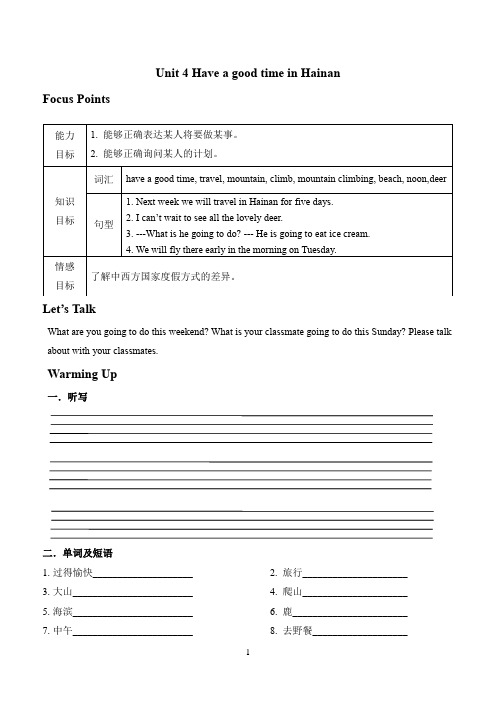
Unit 4 Have a good time in HainanFocus PointsLet’s TalkWhat are you going to do this weekend? What is your classmate going to do this Sunday? Please talk about with your classmates.Warming Up一.听写二.单词及短语1.过得愉快____________________2. 旅行_____________________3.大山________________________4. 爬山_____________________5.海滨________________________6. 鹿_______________________7.中午________________________ 8. 去野餐___________________9. 整天________________________10. 在中午__________________三.课文内容根据提示把句子补充完整。
________ ________(下周)we will travel in Hainan _______ five days. We _______ _______(将要飞往)there early in the morning ________ ________(在周二), November 23rd . In the afternoon, we will ________ ________ ________ _________.(去野炊)On the 24th we will ________ ________ _______(去爬山)all day. November 25th is a free day. We can ________ ________(去购物),swim in the pool or play _______ _______ _______.(在沙滩上)On the 26th we _______ _______ _______(将要)visit a farm. I ________ ________ _______see all the lovely deer. That evening we will camp under the stars. Then we will fly back home at noon the next day. I’m sure we’ll ________ _______ _______ _______in Hainan.Language Points【知识考点一】Next week we will travel in Hainan for five days. 下个星期我们将在海南旅行五天。
新人教初中英语8上Unit 10全单元教案 (5课时)

中学集体备课资料年级:八年级学科:英语课题:Unit10 If you go to the party. You will have a good time.第1课时主备人:【课题】Unit10 If you go to the party. Y ou will have a good time. 教师复备栏【学习目标】Key words and phrases: go to the party,have a good time, organize, video, Key sentences: If you go to the party, you will have a good timeIf you do,【学习重点难点】Ss master key words and sentences, then use them correctly. Ss learn to talk about consequencesSs improve their listening and speaking skills.【学法指导】Speaking and listening【教学过程】Ⅰ. Lead-inAsk some questions.T: If you are happy, what will you do?S: If I am happy, I will smile.T: If you become sad, what will you do?S: If I become sad, I will cry.T: What will happen if you are going to do too much work?S: If I am going to do too much work, I will get tired.Ⅱ. Presentation1.Show some pictures to present new structure:If it is sunny this Sunday, I’ll go fishing.Ask several students:What will you do if it is sunny this Sunday?If I have much money, I will buy a big house.What will you do if you have much money?Practice with the students:2.Show some pictures to present the following:(1) I think I’m going to stay at home.If you do, you’ll be bored.(2) I think I’m going to work until night.If you do, you’ll be tired.(3) I think I’m going to exercise.If you do, you’ll be healthy.(4) If you go to the party, you’ll have a great time.(5) If you watch TV every night, your parents will be mad at you.3. Work on 1a, match the statements with the pictures [a-d].Ⅲ. Game1. Show some pictures in the big screen. Let Ss ask and answer like this:A: What are you going to do …?B: I think I’m going to….A: If you do, you’ll be …Ⅳ. ListeningWork on 1c:1. Point out the statements and the responses in activity 1a. Tell Ss to listen to the recordings and complete the responses.2. Play the recording for the first time, Ss only listen.3. Play the recording again the try to complete the responses.4. Check the answers.Ⅴ. Pair work1. Let Ss read the model with a partner.2. Look at the pictures above. Use the information in 1b. Ask and answer with a partner.3. Let some pairs ask and answer about the pictures.Ⅵ. ListeningWork on 2a:1. Let Ss read the two sentences below. Make sure they know what to do.2. Play the recording for the Ss to listen and circle the right answers.3. Play the recording again to check the answers.Work on 2b:1. Let Ss read the phrases and questions below. Tell Ss that they should answer the questionswith the proper phrases.2. Play the recording for the Ss to write the correct answers.3. Play the recording again to check the answers.Ⅶ. Pair work1. Tell Ss role-play a conversation between Nelly and Mark.2. Give a model to the Ss.3. Ss work in pairs and practice the conversation.4. Ask so me pairs to act out their conversations.Ⅷ. Role-play1. Read the conversations and answer the questions below.(1) What will happen if we ask people to bring food?(2) What will happen if we give people some small gifts if they win?2. Explain some new words and main points in the conversation.3. Let Ss read the conversation after the teacher.4. Practice the conversation with their partner. Then let some pairs to act out theconversation.Homework:1. Recite the conversation in 2d after school.2. 用括号里所给词的适当形式补全句子。
英语教案-Haveagoodtime
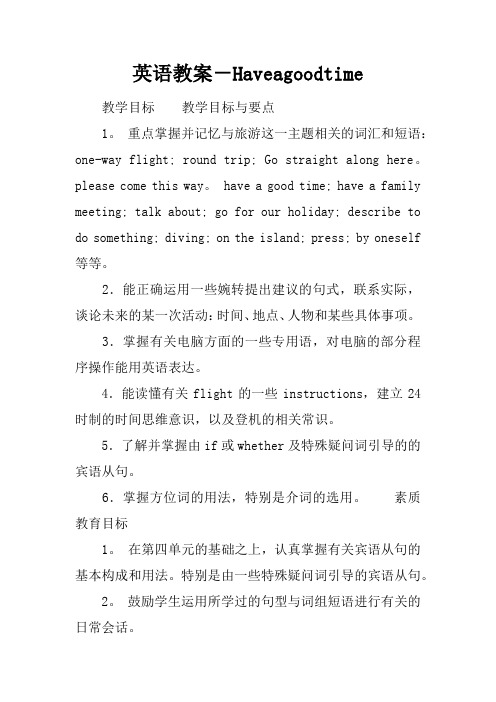
英语教案-Haveagoodtime 教学目标教学目标与要点1。
重点掌握并记忆与旅游这一主题相关的词汇和短语:one-way flight; round trip; Go straight along here。
please come this way。
have a good time; have a family meeting; talk about; go for our holiday; describe to do something; diving; on the island; press; by oneself 等等。
2.能正确运用一些婉转提出建议的句式,联系实际,谈论未来的某一次活动:时间、地点、人物和某些具体事项。
3.掌握有关电脑方面的一些专用语,对电脑的部分程序操作能用英语表达。
4.能读懂有关flight的一些instructions,建立24时制的时间思维意识,以及登机的相关常识。
5.了解并掌握由if或whether及特殊疑问词引导的的宾语从句。
6.掌握方位词的用法,特别是介词的选用。
素质教育目标1。
在第四单元的基础之上,认真掌握有关宾语从句的基本构成和用法。
特别是由一些特殊疑问词引导的宾语从句。
2。
鼓励学生运用所学过的句型与词组短语进行有关的日常会话。
3。
让学生在学习时能体会到旅游的乐趣,并且让学生知道旅游也是一种增长知识的好机会。
能够运用所学句型进行与旅行相关的准备活动,旅游信息的搜集,加工以及谈论和表达旅游过程当中的感受。
4。
在教学过程中,应当调动各种教学媒体,用以加强学生对语言知识的掌握与理解。
5。
认真引导学生运用各种学习手段进行学习,鼓励学生多方搜集与旅游有关的信息,在课堂中进行英语表达,和同学之间进行信息交换等。
以提高同学们的学习兴趣和学习效果。
使部分学生能够运用所学过的与旅游主题相关的词组、短语及相关句型谈论自己的旅游经历。
教学建议本单元句型及日常交际用语一、本单元句型1。
人教版八年级上册英语单元教案(含教材分析)--Unit 1

Unit 1Where did you go on vacation?本单元教材以Where did you go on vacation?为中心话题,围绕着描述“过去发生的事情”展开,学习和运用一般过去时态的一般疑问句Did you go/see/buy...?和特殊疑问句Where/What/How...?询问过去的事件,让学生学会谈论和分享过去发生的事件。
本课教学内容与学生的实际生活密切相关,易于引发学生运用简单的英语进行交流。
在学习活动中,学生通过交换对过去发生的事情的描述及看法,促进学生之间和师生之间的情感交流,增进情谊。
Section A的主要学习内容是:复习一般过去时态和动词的规则与不规则变化,学习一般过去时态的一般疑问句:Did you...?及不定代词的用法。
Section B安排了许多听、说、读、写的任务活动,教师在教学中可以灵活运用这些活动,将其中的一些活动进行变化或整合,充分调动学生参与的积极性,提高学生的听说读写能力。
第一课时Section A(1a-2d)Teaching Goals【教学目标】Key words & phrases:anyone,anywhere,wonderful,few,most,quite a few,go on vacationKey sentences:1.Where did you go on vacation?I went to the mountains/New York City/summer camp/the beach.2.Did you...?Yes,I did./No,I didn't.Teaching Key Points【教学重点】The vocabulary:New York City,Central Park,few,most,quite a few,on vacationTarget language:Where did you/they/he/she go on vacation?I/They/He/She went to the mountains/New York City/summer camp/the beach. Did you...?Yes,I did./No,I didn't.Teaching Difficult Points【教学难点】Use the target language above to talk about past events.Teaching Aids【教学工具】An English textbook,a tape recorder,CAI or courseware.Teaching Steps【教学过程】★Step 1Leading inGreet the class and introduce what to learn in this period.Teacher:Welcome back to school!Did everyone have a good time during the summer vacation?Today we'll begin to learn the topic where you went on vacation.Teacher:Where did you go on vacation?Students:______.①I went to the mountains.②I visited museums.…★Step 2Pre-taskPage 1,1a & 1b.1.Look at the picture.2.Match each activity.3.Check the answers in 1b.4.Practice reading.Page 1,1c.1.Focus on the conversation in the box.2.Practice reading.3.Pairwork:Where did you go on vacation?I...4.Groupwork:Divide the class into groups of four or five. Make conversations.First S1 to S2:S1:Where did you go on vacation?S2:I...S1:Where did she/he go on vacation?S2:She/He...★Step 3While-taskPage 2,2a & 2b.1.Play the recording for the first time. Students complete the chart in 2a.2.Check the answers.(Point to one student who raises his or her hand.)3.Play the recording a second time and say:There are three conversations. The people talk about where they went on vacation. Listen to the recording and check(√)Yes,I did or No,I didn't for each question.4.Correct the answers.★Step 4Post-taskPage 2,2c & 2d.1.Focus on the conversation in 2c & 2d.2.Practice reading. Make students scan the conversations first.3.Teach and then make students role-play the conversation in pairs.4.Have a group of students present their conversation to the class.★Step 5Homework1.Practice the conversation on Page 2,2d.2.Do the exercises on Page 1 in students' book.Board Design板书设计Unit 1Where did you go on vacation?The first period Section A(1a-2d)1.Key vocabulary:anyone,anywhere,wonderful,quite a few,go on vacation 2.Target language:A:Where did Tina go on vacation?B:She went to the mountains.第二课时Section A(GF-3c)Teaching Goals【教学目标】Key words:something,nothing,everyone,myself,yourself,someone,seem,bored,diaryKey phrases:go out,have a good time,of course,keep a diaryKey sentences:1.Where did you go on vacation?I went to New York City.2.Did you go out with anyone?Did you buy anything special?3.How was the food?How was your vacation?Teaching Key Points【教学重点】The vocabulary:something,nothing,everyone,myself,yourself,someone,seem,bored,diary,go out,have a good time,of course,keep a diary,on vacation Target language:How was the food?Everything tasted really good!Did you go shopping?Of course!Did everyone have a good time?Oh,yes. Everything was excellent.Teaching Difficult Points【教学难点】e the target language above to talk about past events.2.The usage of someone,anyone,everyone,no one,something,anything,everything,nothing.Teaching Aids【教学工具】An English textbook,CAI or courseware.Teaching Steps【教学过程】★Step 1Leading in(T—teacher S—student)T:Where did you go last weekend?S:I went to the beach.T:Did you go there with anyone?S:Yes. I went to the beach with my brother.T:Did you have a good time there?S:...★Step 2Pre-taskPage 3,Grammar Focus.1.Review the grammar box. Work in pairs. One asks and the other answers.2.Practice reading the sentences in the chart.★Step 3While-taskPage 3,3a & 3b.1.Teach these new words:anyone,something,anything,everything,nothing,everyone,no one.2.Call students' attention to the conversation in 3a. Make students complete it individually.3.Choose a student to give his or her answers. Write the answers on the board.4.Correct the answers.5.Lead students to read this conversation.6.Have students work in pairs and role-play the conversation. As they talk,move around the classroom monitoring their work. Offer language or pronunciation support as needed.7.Make students complete the blanks in the e-mail message in 3b with the words in the box.8.Check the answers and then make students practice reading it.★Step 4Post-taskPage 3,3c.Complete the task in 3c.Ask your group questions about their last vacation. Then tell the class your results.★Step 5Homework1.Review the indefinite pronouns learned in this period.2.Do the exercises on Page 2 in students' book.Board Design板书设计Unit 1Where did you go on vacation?The second period Section A(GF-3c)1.The vocabulary:something,nothing,everyone,someone,myself,yourself,go out,of course2.Target language:①A:Where did you go on vacation?B:I went to New York City.②A:Did you buy anything special?B:Yes,I bought something for my father.3.Structure:something special4.Answers to 3a and 3b.第三课时Section B(1a-1e)Teaching Goals【教学目标】Key words:delicious,exciting,terrible,expensive,cheap,boringKey sentences:1.Where did Lisa go on vacation?2.Did she do anything special there?Did she buy anything for her best friend?Did Lisa like her vacation?3.How was/were...?Teaching Key Points【教学重点】The vocabulary:delicious,exciting,terrible,expensive,cheap,boringTarget language:Where did Lisa go on vacation?Did she do anything special there?Did she buy anything for her best friend?How was/were...?Teaching Difficult Points【教学难点】1.询问去过何地以及感受(评价)Where did you go?I went to the beaches. How was it?It was exciting.2.Use the target language to talk about your past events.Teaching Aids【教学工具】An English textbook,a tape recorder,CAI or courseware.Teaching Steps【教学过程】★Step 1Leading in1.Greetings.2.T:Where did you go on vacation?S:I went to summer camp.T:Did you do anything special there?S:Yes,I...T:Did you buy anything for your parents or friends?S:Yes,I bought...for.../No,I bought nothing.T:How was/were...?S:It was/They were...★Step 2Pre-taskPage 4,1a & 1b.1.Look at the six pictures.2.Match the words with the pictures.3.Students complete the task in 1b individually.4.Check the answers.★Step 3While-taskPage 4,1c & 1d.1.Make students scan the questions in 1c.2.Play the recording for the first time. And say:Listen to the tape. Lisa is talking about her vacation. Complete the four questions.3.Play the recording a second time. Students complete the task in 1d.4.Correct the answers.★Step 4Post-taskPage 4,1e.Ask 3 or 4 students to answer questions about Lisa's vacation. You can begin your questions with:Where did...?What did...?Did she...?How was...?How were...?★Step 5Homework1.Review these sentences:Where did...?Did...?How was/were...?2.Do the exercises on Page 3 in students' book.Board Design板书设计Unit 1Where did you go on vacation?The third period Section B(1a-1e)1.Words:delicious,exciting,terrible,expensive,cheap,boring2.Sentences:①Where did Lisa go on vacation?②Did she buy anything special?③Did she buy anything for her best friend?④Did Lisa like her vacation?3.Answers to Activity 1a:1—5f a c e b dAnswers to Activity 1b:wordsdeliciousexcitingcheapwordsterribleexpensiveboring第四课时Section B(2a-2e)Teaching Goals【教学目标】Key words:activity,decide,try,bird,bicycle,building,trader,wonder,difference,top,wait,umbrella,wet,below,enough,hungry,asKey phrases:feel like,because of,go to the beach,a lot of,a little,take the train,too many,what aboutKey sentences:1.I wonder what life was like here in the past.2.What a difference a day makes!3.We waited over an hour for the train because there were too many people.Teaching Key Points【教学重点】Learn Jane's diary entries about her vacation.1.The vocabulary:activity,decide,try,wonder,difference,wait,below,enough,hungry,as,feel like,because of2.Target language:I wonder what life was like here in the past. We waited over an hour for the train because there were too many people.Teaching Difficult Points【教学难点】1.because and because of2.What a difference a day makes!3.Learn to write a diary.Teaching Aids【教学工具】An English textbook,CAI or courseware.Teaching Steps【教学过程】★Step 1Leading in1.Greetings.2.Introduce what to learn in this period,especially the articles in 2b,Jane's diary entries. Teacher begins like this:Today we'll focus on two diary entries about Jane's vacation. Through the learning you'll know how to write a diary. Let's begin now.★Step 2Pre-taskPage 5,2a & 2b.1.Review and discuss the questions in 2a box with your partner.2.Project these new words on the screen or write them on the board and teach the new words. Ask students to repeat them. And make sure everyone knows the meanings.activity n.活动;decide v.决定;try v. & n.尝试,设法;wonder v.想知道;difference n.差异;top n.顶部;wait v. & n.等待;umbrella n.伞;below prep.& adv.在……下面;enough adj.充足的;hungry adj.饥饿的3.Make students scan the articles first. Ask students to put a mark in contents that are unfamiliar to them. Then the teacher lead students to learn these two articles sentence by sentence. Pay attention to these points:(1)decide v.决定;decide to do sth.决定做某事;(2)try v.尝试;try doing sth.尝试做某事;try to do sth.尽力做某事;(3)below prep. & adv.在……下面;(4)feel like 给……的感觉;(5)because and because of;(6)wonder v.想知道4.Practice reading.★Step 3While-taskPage 6,2c & 2d.1.Make students read Jane's diary entries again. Fill in the chart in 2c.2.Students complete the conversation in 2d using the information in Jane's dairy entries.3.Choose 3 or 4 students to give their answers.4.Correct the answers.5.Have students work in pairs. Student A will be Anna and student B will be Jane. Act the conversation out.★Step 4Post-taskPage 6,2e.1.Make students complete the blanks in 2e.2.Ask one student to write his or her answers on the board.3.Check the answers together with the class.4.Practice reading.★Step 5Homework1.Write a diary.2.Do the exercises on Page 4 in students' book.Board Design板书设计Unit 1Where did you go on vacation?The fourth period Section B(2a—2e)1.Key vocabulary:decide,try,wonder,difference,top,wait,below,enough,hungry,as,feel like,because of,too many2.Sentences:①I wonder what life was like here in the past.②And because of the bad weather,we couldn't see anything below.第五课时Section B(3a-Self Check)Teaching Goals【教学目标】Key words & phrases:duck,dislike,take photos,Tian'anmen Square,the Palace Museum,bring back,shopping center,have a fun time,school trip,come upKey sentences:1.How did you feel about the trip?2.It was so beautiful that we forgot about the last five hours!Teaching Key Points【教学重点】The vocabulary:dislike,take photos,Tian'anmen Square,the Palace MuseumTarget language:What did you like best?Did you dislike anything?How did you feel about the trip?Teaching Difficult Points【教学难点】Write a travel diary.Teaching Aids【教学工具】An English textbook,CAI or courseware.Teaching Steps【教学过程】★Step 1Leading in1.Greetings.2.T:Beijing is the capital of our country. It's famous for its long history and places of interest,such as Tian'anmen Square,the Palace Museum,the Summer Palace and so on. And Beijing duck is very delicious. Have you ever been to Beijing?Tell your travel to us.★Step 2Pre-taskPage 7,3a.1.Look at the three pictures.2.Use the words and phrases in the box to complete the blanks in the article.3.Check the answers.★Step 3While-taskPage 8,Self Check.Complete the tasks in Self Check.1.Have students complete the task of Part 1.Then Choose 2 or 3 students to give their answers. Check the answers.2.Induct students to complete the passage of Part 2.Check the answers.3.Practice reading.★Step 4Post-taskPage 7,3b & 3c.1.Make students answer the questions in 3b and take notes.2.Teach students how to write a travel diary.3.Students write a travel diary like Jane's on Page 5 using the notes in 3b.4.Choose 2 or 3 students' diaries. Make students read them out. Point out the weakness and induct the students to correct their diaries.★Step 5Homework1.Write a travel diary.2.Do the exercises on Page 5 in students' book.Board Design板书设计Unit 1Where did you go on vacation?The fifth period Section B(3a-Self Check)1.Key vocabulary:dislike,Tian'anmen Square,the Palace Museum,have a fun time,come up2.Sentences:①Did you dislike anything?②How did you feel about the trip?③My legs were so tired that I wanted to stop.。
《Have a Good Time》英语说课PPT
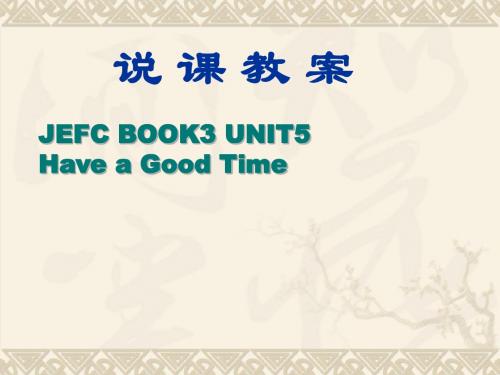
教学目标 Help students : 1. To learn new words, expressions and grammar.(知识目标) 2 . To use information technology available.
PERFORMANCE ASSESMENT FORM1
Name Initiative
Cooperation
Role
Notebook
PERFORMANCE ASSESMENT FORM2
Name Presentation (theme, content, confidence, fluency, skill, humor)
重点和难点 Employ various techniques to bridge the gap between the outside world and the students need. Help students to learn to review their experience.
The Green s Your own group
Double left click on the Internet icon
Press the enter button
Type in the website
Hainan Island
Lesson 1are to make holiday arrangements .
Lesson 19
Task 1: Students are to book tickets for the holiday. Task 2: Students are to write a travel postcard to a friend..
【K12学习】英语教案-Have a good time
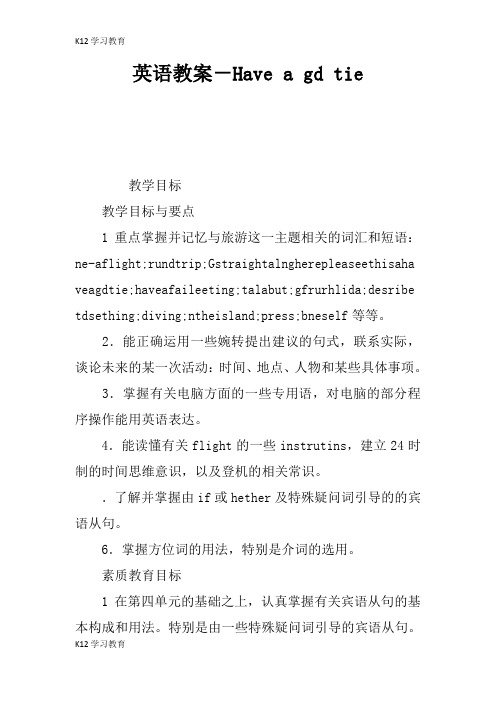
英语教案-Have a gd tie教学目标教学目标与要点1重点掌握并记忆与旅游这一主题相关的词汇和短语:ne-aflight;rundtrip;Gstraightalngherepleaseethisaha veagdtie;haveafaileeting;talabut;gfrurhlida;desribe tdsething;diving;ntheisland;press;bneself等等。
2.能正确运用一些婉转提出建议的句式,联系实际,谈论未来的某一次活动:时间、地点、人物和某些具体事项。
3.掌握有关电脑方面的一些专用语,对电脑的部分程序操作能用英语表达。
4.能读懂有关flight的一些instrutins,建立24时制的时间思维意识,以及登机的相关常识。
.了解并掌握由if或hether及特殊疑问词引导的的宾语从句。
6.掌握方位词的用法,特别是介词的选用。
素质教育目标1在第四单元的基础之上,认真掌握有关宾语从句的基本构成和用法。
特别是由一些特殊疑问词引导的宾语从句。
2鼓励学生运用所学过的句型与词组短语进行有关的日常会话。
3让学生在学习时能体会到旅游的乐趣,并且让学生知道旅游也是一种增长知识的好机会。
能够运用所学句型进行与旅行相关的准备活动,旅游信息的搜集,加工以及谈论和表达旅游过程中的感受。
4在教学过程(91aixue)中,应当调动各种教学媒体,用以加强学生对语言知识的掌握与理解。
认真引导学生运用各种学习手段进行学习,鼓励学生多方搜集与旅游有关的信息,在堂中进行英语表达,和同学之间进行信息交换等。
以提高同学们的学习兴趣和学习效果。
使部分学生能够运用所学过的与旅游主题相关的词组、短语及相关句型谈论自己的旅游经历。
教学建议本单元句型及日常交际用语一、本单元句型1Duidshaveanideas?2Ithinthatsagdidea3HabutHainanIsland?4uanditburselfHainanislandisthesendlargestislandfhina6Huhdesitsttdsething?7Thepriefatietfr…t…is…uannea8uldutellehuhitststfltHainan?9uldutelleifthereisaflightintherningnNveber,26th?10ulduteahehtsearhtheinternet?11Idlietbatiet/ar,please?12Pleasegstraightalnghere13Pleaseethisa14uldutellethatsafasttrainrnt?1Thatssundverl二、日常交际用语1.表示祝福Haveagdtie!2.有关电脑方面用语DubleleftlintheinternetinLeftlinaninterestingstrabut3.表示建议HabutHainanIsland?4表示感叹h,!/hat!hatasurprise!Hsurprising/aazing/strange!gdness!/Gdnesse!Unbelievable!/Surprising!Itsreallasurprise!Iantbelieveit/ees!Ianhardlbelieveit!ell,thatsversurprising.其他Thatsundsrealll.Ihadagreattie.教材内容分析本单元是围绕Haveagdtie这一话题,结合宾语从句展开教学活动的。
新外研版英语四年级下册Module 8 Unit 1教案

Module 8Unit 1 They sang beautifully.Teaching Aims:1、知识目标:(1)全体学生能理解和运用sang,beautifully,saw,game,last,fun,went,there,ate,drank,drinks,time,havea good time, busy(2)全体学生能理解和运用:They sang beautifully.2、技能目标:(1)全体学生能听懂:They sang beautifully.(2)全体学生能说:They sang beautifully.(3)全体学生能认读:sang, beautifully, saw, game, there, ate, drank, drinks, time, busy.(4)全体学生能拼写2-3个自选单词。
(5)大部分学生能运用一般过去时谈论过去的事情。
3、情感目标:乐于参与学习和感知英语,并积极尝试使用英语,从会用英语做事情中体验到学英语的快乐。
Teaching Points and difficulties:不规则动词的过去式Teaching Methods:情景教学法、小组合作法、任务型教学法Teaching Aids:单词卡片、点读机、教学光盘、学生照片Teaching Steps:Step 1 Warming up复习动词或词组,教师快速出示词组卡片go by bus,see some birds,sing,eat some food,drink some juice,have a picnic学生快速反应,脱口而出,教师将卡片贴在黑板上。
Step 2 Lead in当出示完最后一个词组have a picnic时,T:Do you like picnic?S:Yes,I do.T:Last Sunday,Amy and Sam had a picnic. 出示卡片并教读“Last Sunday”(贴黑板)。
人教版PEP三年级英语下册第四单元教案
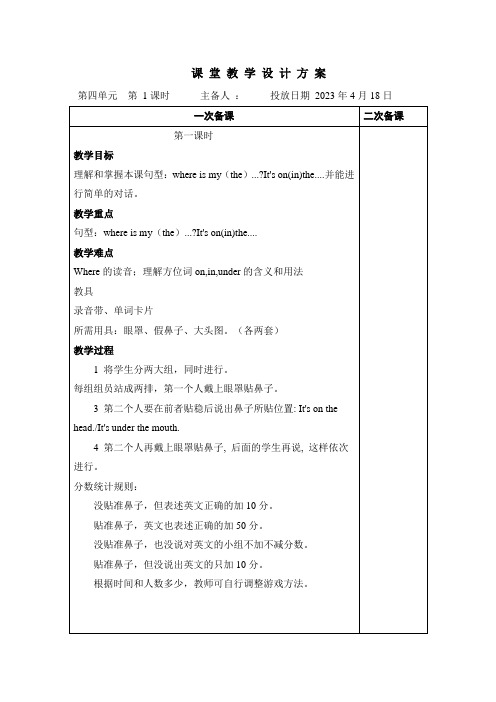
课堂教学设计方案第四单元第1课时主备人:投放日期2023年4月18日教学板书Unit 4 Where is my car?(A) Let's talkWhere is my(the)...?It's on(in)the...作业设计一、选择正确的图片,将其选项填入题前括号内。
( ) 1. in the book A. (麻烦找一张铅笔 B.夹在书里的图片)( ) 2. in the desk A. B. 画一张书在课桌里的图( ) 3. under the desk A. 书在课桌下图 B. 书在课桌里图( ) 4. under the pencil box A.书在文具盒下面 B. 书在课桌下面二、选择正确的单词补全句子。
( ) 1. Where ______ my book?A. isB. theC. are( ) 2. Let’s _______ home.A. goingB. to goC. go( ) 3.Silly ______!A.IB. meC. my教学反思课堂教学设计方案第四单元第2课时主备人: 投放日期2022/4/18Unit 4 Where is my car? (A) Let's learn on in under chair desk作业设计一、 将下列字母按正确顺序排列组成单词,并写在相应图片的下方。
1. e s k d 2. a c h i r 3. u d e r n 4. r l e r u二、根据图片选择正确的单词。
( ) 1.The pencil is ______ the book.A. inB. on( ) 2. The ruler is _______ the pencil box. A. on B. under( ) 3. The ______ is on the desk.A. bookB. pencil box( ) 4. The pencil box is ________ the bag. A. on B. in( ) 5. The book is under the ________.A. chairB. desk教学反思课 堂 教 学 设 计 方 案第四单元 第3课时 主备人 投放日期 2023年4月18日一次备课二次备课 第三课时 教学内容 (A) Let's spell这里需要五个图,每个小题后边放一个。
六年级英语上册教案第三单元
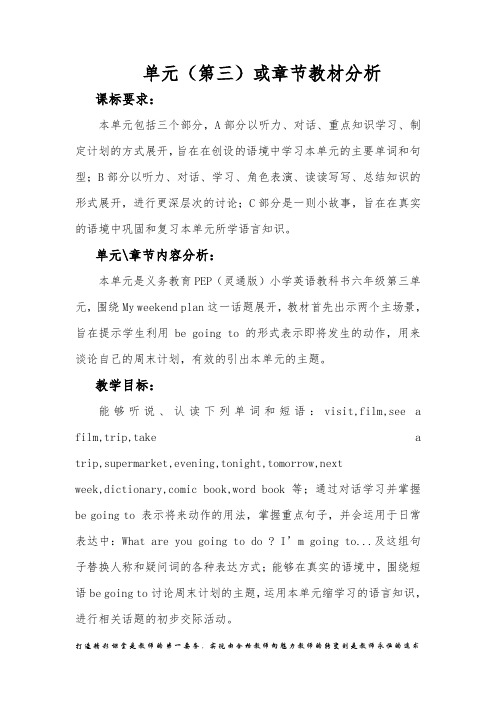
单元(第三)或章节教材分析课标要求:本单元包括三个部分,A部分以听力、对话、重点知识学习、制定计划的方式展开,旨在在创设的语境中学习本单元的主要单词和句型;B部分以听力、对话、学习、角色表演、读读写写、总结知识的形式展开,进行更深层次的讨论;C部分是一则小故事,旨在在真实的语境中巩固和复习本单元所学语言知识。
单元\章节内容分析:本单元是义务教育PEP(灵通版)小学英语教科书六年级第三单元,围绕My weekend plan这一话题展开,教材首先出示两个主场景,旨在提示学生利用be going to 的形式表示即将发生的动作,用来谈论自己的周末计划,有效的引出本单元的主题。
教学目标:能够听说、认读下列单词和短语:visit,film,see a film,trip,take a trip,supermarket,evening,tonight,tomorrow,nextweek,dictionary,comic book,word book等;通过对话学习并掌握be going to 表示将来动作的用法,掌握重点句子,并会运用于日常表达中:What are you going to do ? I’m going to...及这组句子替换人称和疑问词的各种表达方式;能够在真实的语境中,围绕短语be going to讨论周末计划的主题,运用本单元缩学习的语言知识,进行相关话题的初步交际活动。
教学重点:能够听说、认读下列单词和短语:visit,film,see a film,trip,take a trip,supermarket,evening,tonight,tomorrow,nextweek,dictionary,comic book,word book等;通过对话学习并掌握be going to 表示将来动作的用法,掌握重点句子,并会运用于日常表达中:What are you going to do ? I’m going to...及这组句子替换人称和疑问词的各种表达方式;能够在真实的语境中,围绕短语be going to讨论周末计划的主题,运用本单元缩学习的语言知识,进行相关话题的初步交际活动。
五年级下册英语- Unit 4 Have a good time in Hainan 教科版

In the afternoon, we will go for a picnic.
4、go for a picnic 去野餐
go on a picnic 3、书上前三句比较容易理解,后三句都包含着典故。教师相机讲述《关羽失荆州》《王羲之写字入木三分的由来》《周瑜打黄盖》的典故。
教师要练就扎实的写字功底,提高汉字书写水平和书法修养,对学生的书写进行有效指导,倡导“提笔即是练字时”,把写字的指导落实在日常每一个教学活动中。要求学生把写字 作为每日的必修课,指导学生临摹和练习,不定期开展书写竞赛,交流优秀作品,营造浓厚的练字氛围。
have a picnic 朗读课文,感悟文本的情感,比较重要的一点是能抓住重点词语进行重点品析、感悟。学生如何去抓住重点词句,这一方面离不开老师的指导。
• Homework
Unit 4 Have a good time in Hainan
Words and phrases
•爬 • 海滩 • 旅行 •鹿 • 中午 • 大山
• climb • beach • travel • deer • noon • mountain
Phrases
Are you ready?
介绍过程中,允许听的人提出一些问题,介绍者回答或其他同学补充,使口语交际能够真正交流起来。 1.背诵时要理解内容,理解得越深越容易背,其记忆量也越大。 习作前小组交流,说说自己最想写什么,互相启发,打开思路。 我和七个同伴及一个生物学家向导,结队来到南太平洋加拉巴哥岛旅游。在这个海岛上,有许多太平洋绿龟在筑巢孵化小龟。我们的目的,就是想实地观察一下幼龟是怎样离巢进 入大海的。 读中学就是要读懂文章的思想内容、文章结构、文章所要表达得情感。写就是要学习作者的表达方法,把自己的所见、所闻、所感写出来。 我几次兴奋地想上车与父亲共享这幸福的时刻,都被他赶了下来。
广州版小学英语五年级下册:Unit 4 Have a good time in Hainan

Unit 4 Have a good time in HainanFocus PointsLet’s TalkWhat are you going to do this weekend? What is your classmate going to do this Sunday? Please talk about with your classmates.Warming Up一.听写二.单词及短语1.过得愉快____________________2. 旅行_____________________3.大山________________________4. 爬山_____________________5.海滨________________________6. 鹿_______________________7.中午________________________ 8. 去野餐___________________9. 整天________________________10. 在中午__________________三.课文内容根据提示把句子补充完整。
________ ________(下周)we will travel in Hainan _______ five days. We _______ _______(将要飞往)there early in the morning ________ ________(在周二), November 23rd . In the afternoon, we will ________ ________ ________ _________.(去野炊)On the 24th we will ________ ________ _______(去爬山)all day. November 25th is a free day. We can ________ ________(去购物),swim in the pool or play _______ _______ _______.(在沙滩上)On the 26th we _______ _______ _______(将要)visit a farm. I ________ ________ _______see all the lovely deer. That evening we will camp under the stars. Then we will fly back home at noon the next day. I’m sure we’ll ________ _______ _______ _______in Hainan.Language Points【知识考点一】Next week we will travel in Hainan for five days. 下个星期我们将在海南旅行五天。
陕旅版六年级英语下册全册教案

六年级英语(下册)教学计划一、教材分析本册教材是根据教育部颁布的《全日制义务教育、普通高级中学英语课程标准(实验稿)》规定的小学毕业应达到二级水平的要求。
根据小学生的年龄、心理特点和生活实践,教材的编写注重和激发培养学生学习语言的兴趣,通过形式多样的话题、丰富多彩的语境活动、活泼有趣的二个和歌曲,加上文中生动、幽默的卡通图画,让学生在听、说、读、写、演、玩、唱等过程中轻松的感知英语、学习英语,达到学习掌握英语、运用英语的目的。
培养学生在与人交往过程中的自信心和英语交际能力,即开发了智力,又培养了他们的综合素质。
为中学英语的学习奠定了良好的基础。
本册教材的特点是:1.强调语言运用。
2.注重能力培养3.突出兴趣激发4.重视双向交流5.融合学科内容6.重视灵活扩展7.实现整体设计二、教材重难点(一)教材重点1、能按三会、四会的要求掌握所学单词、掌握所学句型。
2、能使用日常交际用语,活用四会句型,进行简单的交流,做到大胆开口,发音正确。
3、能在图片、手势、情境等非语言提示的帮助下,听懂清晰的话语和录音。
(二)教材难点1.一般现在时、一般将来时、一般过去时等几个小学阶段所学句型中对人称、是动词的变化、行为动词的运用。
2.对四会要求掌握所学句型的灵活运用:对话、写作、阅读。
3.教学内容与学生的生活经验知识层次的有机结合。
三、教学措施1、以活动为课堂教学的主要形式,设计丰富多彩的教学活动,让学生在乐中学、学中用,从而保证学生英语学习的可持续性发展。
2、通过听、说、读、写、唱、游、演、画、做等形式,进行大量的语言操练和练习。
3、培养学生拼读音标的能力,确保学生自主学习的质量。
4、设计全面、高效的课外作业,培养学生良好的书写习惯,做到整洁、规范、正确地书写。
四、学情分析.本班共26名学生,其中女生13名,学生对学习英语的兴趣整体有所上升,但两极分化较严重。
所以本学期应做好后进生的转化工作。
激发学生学习英语的兴趣,培养他们学习英语的积极态度,使他们初步建立学习英语的自信心,培养学生具有一定的语感和良好的语音、语调、书写基础,以及良好的学习习惯,使他们初步具备用英语进行简单日常交流的能力。
五年级下册英语知识点梳理-Unit4-Have-a-good-time-in-Hainan(含答案)
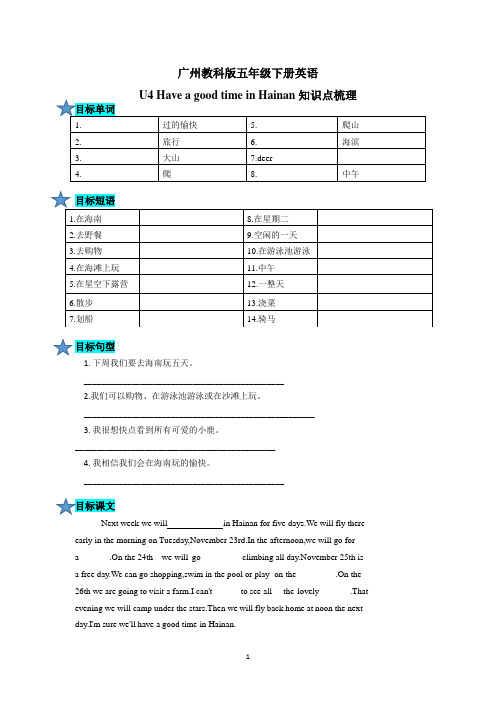
广州教科版五年级下册英语目标句型1. 下周我们要去海南玩五天。
______________________________________________ 2.我们可以购物、在游泳池游泳或在沙滩上玩。
_____________________________________________________ 3. 我很想快点看到所有可爱的小鹿。
______________________________________________ 4. 我相信我们会在海南玩的愉快。
______________________________________________Next week we willin Hainan for five days.We will fly thereearly in the morning on Tuesday,November 23rd.In the afternoon,we will go for a_______.On the 24th we will go _________climbing all day.November 25th is a free day.We can go shopping,swim in the pool or play on the_________.On the 26th we are going to visit a farm.I can't ______to see all the lovely_______.That evening we will camp under the stars.Then we will fly back home at noon the next day.I'm sure we'll have a good time in Hainan.目标语言点1.on Tuesday,November 23rd具体日期前的介词为on,月份前的介词为in,具体时间前的介词为at.例:Children’s day is in June.Children’s day is on June 1.I always get up at six o’cl ock in the morning.2.deer的用法deer是单复数同形的名词其他单复数同形的名词还有fish,sheep等例: There is a deer on the farm.There are five deer on the farm.3.will+动词原形“wi ll+动词原形”是表达一般将来时的句型之一,表示将来某个时间会发生的动作。
Module 2 Unit 4 Have a good time in Hainan教案新部编本

教师学科教案[ 20 – 20 学年度第__学期]任教学科:_____________任教年级:_____________任教老师:_____________xx市实验学校Module 2 PlansUnit 4 Have a good time in Hainan教案教学内容:教育科学出版社英语(三起)五年级下册Unit 4 Have a good time in Hainan部分内容。
教学目标(Objectives):1.确保学生认识和理解一些基本单词的意义和简单口头运用(To learn the meaning and simple usages of some words and phrases)。
2.学习使用本单元重点句型及表达(To use the typical sentences to express)。
3.鼓励学生大胆发言及表达(To encourage the students to express bravely)。
4.培养学生对英语学科的兴趣(To make the students interested in English learning)。
教学重点(Key Points):1.词汇check in,go for a walk on the farm,go for a picnic,water vegetables,cook in the kitchen,go horse-riding2.课文结构以及对于我们的意义。
在学习了单词的基础上,以单词为载体,进行主要句型的学习,根据具体情境,学会交流对话,侧重句型学习,交际意向和课外拓展为重点。
-- What is he╱she going to do?-- He ╱She is going to…-- What are you going to do this weekend?-- I’m going to…情感、策略、文化意识目标1.通过本课学习了解询问是否会做什么的用法。
【人教版】八年级英语上册:Unit 10 优秀教学案(含答案解析)
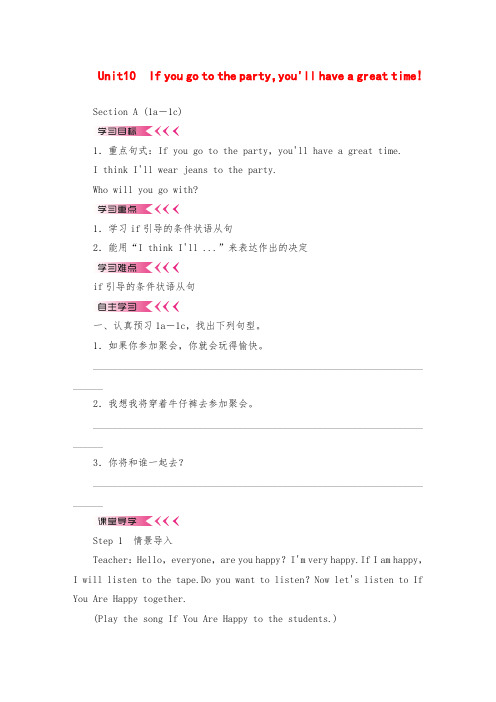
Unit10 If you go to the party,you'll have a great time!Section A (1a-1c)1.重点句式:If you go to the party,you'll have a great time.I think I'll wear jeans to the party.Who will you go with?1.学习if引导的条件状语从句2.能用“I think I'll ...”来表达作出的决定if引导的条件状语从句一、认真预习1a-1c,找出下列句型。
1.如果你参加聚会,你就会玩得愉快。
__________________________________________________________________ ______2.我想我将穿着牛仔裤去参加聚会。
__________________________________________________________________ ______3.你将和谁一起去?__________________________________________________________________ ______Step 1 情景导入Teacher:Hello,everyone,are you happy?I'm very happy.If I am happy,I will listen to the tape.Do you want to listen?Now let's listen to If You Are Happy together.(Play the song If You Are Happy to the students.)环节说明:用歌曲If You Are Happy导入新课,让学生在歌声中轻松的进入学习状态,且切入学习主题,并在歌声中提前感知if 的用法。
英语教案-Haveagoodtime.docx
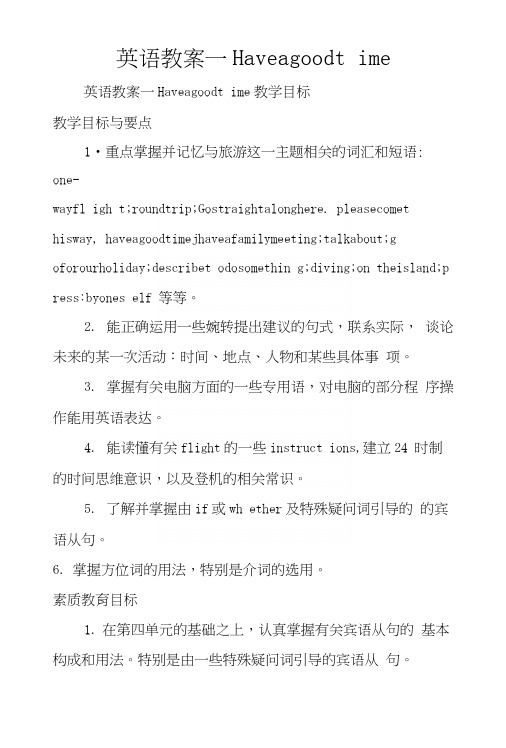
英语教案一Haveagoodt ime 英语教案一Haveagoodt ime教学目标教学目标与要点1•重点掌握并记忆与旅游这一主题相关的词汇和短语: one-wayfl igh t;roundtrip;Gostraightalonghere. pleasecomet hisway, haveagoodtimejhaveafamilymeeting;talkabout;g oforourholiday;describet odosomethin g;diving;on theisland;p ress:byones elf 等等。
2.能正确运用一些婉转提出建议的句式,联系实际,谈论未来的某一次活动:时间、地点、人物和某些具体事项。
3.掌握有关电脑方面的一些专用语,对电脑的部分程序操作能用英语表达。
4.能读懂有关flight的一些instruct ions,建立24 时制的时间思维意识,以及登机的相关常识。
5.了解并掌握由if或wh ether及特殊疑问词引导的的宾语从句。
6.掌握方位词的用法,特别是介词的选用。
素质教育目标1.在第四单元的基础之上,认真掌握有关宾语从句的基本构成和用法。
特别是由一些特殊疑问词引导的宾语从句。
2.鼓励学生运用所学过的句型与词组短语进行有关的日常会话。
3.让学生在学习时能体会到旅游的乐趣,并且让学生知道旅游也是一种增长知识的好机会。
能够运用所学句型进行与旅行相关的准备活动,旅游信息的搜集,加工以及谈论和表达旅游过程中的感受。
4.在教学过程( )中,应当调动各种教学媒体,用以加强学生对语言知识的掌握与理解。
5.认真引导学生运用各种学习手段进行学习,鼓励学生多方搜集与旅游有关的信息,在课堂中进行英语表达,和同学之间进行信息交换等。
以提高同学们的学习兴趣和学习效果。
使部分学生能够运用所学过的与旅游主题相关的词组、短语及相关句型谈论自己的旅游经历。
教学建议本单元句型及日常交际用语一、本单元句型1.Doyouk idshaveanyi deas?2.It hinkthatsag oodidea.3 . HowaboutHa inanlsland?4.Youcand oitbyyourse If.5.Hain anislandist hesecondlar gestislando fChina.6.Howmuchdoes it cos ttodos ome thing?7.Thepriceo faticketfro m・・・to・・・is・・・yuanoneway.8 . Couldyoute llmehowmuch itcoststof 1 ytoHainan?9.Couldyou tellmeifthe reisaflight inthemornin gonNovember , 26th?10.Couldyoutea chmehowtose archtheinte rnet?11.I dliketobook aticket/aro om, please?12.Pleaseg ostraightal onghere・1 3. Pleasecom ethisway.14.Couldyou tellmethats afasttraino rnot?15.T hatssoundve rycool・二、日常交际用语1.表示祝福H aveagoodtim e!2.有关电脑方面用语Doublele ftclickonth eint erne tic on.Leftel ickonanyint erestingsto ryabout・・3.表示建议Howab outHainanls land?4.表示感叹Oh, my!/What !Whatasurpr ise!Howsu rprising/am azing/stran ge!Mygood ness!/Goodn essme!Unb elievable!/Surprising!Itsreallyas urprise!I cantbelieve it/myeyes!I canhardlybe lieveit!W ell, thatsve rysurprisin g.5.其他Tha tsoundsreal lycool・Ihad agreattime・教材内容分析本单元是围绕Haveagoo dtime这一话题,结合宾语从句展开教学活动的。
- 1、下载文档前请自行甄别文档内容的完整性,平台不提供额外的编辑、内容补充、找答案等附加服务。
- 2、"仅部分预览"的文档,不可在线预览部分如存在完整性等问题,可反馈申请退款(可完整预览的文档不适用该条件!)。
- 3、如文档侵犯您的权益,请联系客服反馈,我们会尽快为您处理(人工客服工作时间:9:00-18:30)。
英语教案-Have a gd tie教学目标教学目标与要点1重点掌握并记忆与旅游这一主题相关的词汇和短语:ne-aflight;rundtrip;Gstraightalngherepleaseethisaha veagdtie;haveafaileeting;talabut;gfrurhlida;desribe tdsething;diving;ntheisland;press;bneself等等。
2.能正确运用一些婉转提出建议的句式,联系实际,谈论未来的某一次活动:时间、地点、人物和某些具体事项。
3.掌握有关电脑方面的一些专用语,对电脑的部分程序操作能用英语表达。
4.能读懂有关flight的一些instrutins,建立24时制的时间思维意识,以及登机的相关常识。
.了解并掌握由if或hether及特殊疑问词引导的的宾语从句。
6.掌握方位词的用法,特别是介词的选用。
素质教育目标1在第四单元的基础之上,认真掌握有关宾语从句的基本构成和用法。
特别是由一些特殊疑问词引导的宾语从句。
2鼓励学生运用所学过的句型与词组短语进行有关的日常会话。
3让学生在学习时能体会到旅游的乐趣,并且让学生知道旅游也是一种增长知识的好机会。
能够运用所学句型进行与旅行相关的准备活动,旅游信息的搜集,加工以及谈论和表达旅游过程中的感受。
4在教学过程(91aixue)中,应当调动各种教学媒体,用以加强学生对语言知识的掌握与理解。
认真引导学生运用各种学习手段进行学习,鼓励学生多方搜集与旅游有关的信息,在堂中进行英语表达,和同学之间进行信息交换等。
以提高同学们的学习兴趣和学习效果。
使部分学生能够运用所学过的与旅游主题相关的词组、短语及相关句型谈论自己的旅游经历。
教学建议本单元句型及日常交际用语一、本单元句型1Duidshaveanideas?2Ithinthatsagdidea3HabutHainanIsland?4uanditburselfHainanislandisthesendlargestislandfhina6Huhdesitsttdsething?7Thepriefatietfr…t…is…uannea8uldutellehuhitststfltHainan?9uldutelleifthereisaflightintherningnNveber,26th?10ulduteahehtsearhtheinternet?11Idlietbatiet/ar,please?12Pleasegstraightalnghere13Pleaseethisa14uldutellethatsafasttrainrnt?1Thatssundverl二、日常交际用语1.表示祝福Haveagdtie!2.有关电脑方面用语DubleleftlintheinternetinLeftlinaninterestingstrabut3.表示建议HabutHainanIsland?4表示感叹h,!/hat!hatasurprise!Hsurprising/aazing/strange!gdness!/Gdnesse!Unbelievable!/Surprising!Itsreallasurprise!Iantbelieveit/ees!Ianhardlbelieveit!ell,thatsversurprising.其他Thatsundsrealll.Ihadagreattie.教材内容分析本单元是围绕Haveagdtie这一话题,结合宾语从句展开教学活动的。
以准备旅游,开始旅游,谈论旅游,以旅游为核心主题,集中呈现一系列与旅游相关的词组短语和句型。
学习了婉转提出建议的表达方式及请求和说明的日常交际用语。
要求掌握电脑方面的一些用语,对电脑的部分程序操作能用英语进行表达。
能读懂有关flight的一些instrutins,建立24时制的时间思维方式,以及登机的有关常识。
讲述了以特殊疑问词引导的宾语从句,要求学生在交谈的过程中,在交际的语境中了解并掌握有关以疑问代词或疑问副词所引导的宾语从句。
如:uldutelleif/hetherthereisaflight +时间?本单元的内容与我们生活密切相关,应认真学习,掌握一些日常用语和常用词汇及相关常识,为我们日后的travelrtrip作好准备。
本单元重点难点分析1Davidand,en,erehavingafaileeting大卫、乔伊,快点,我们要开家庭会。
en在此表示鼓励、挑战、恳求、要求等感叹语,可译作赶快;来吧;快点。
例如:(1)en,tritagain!来吧,再试一下!(2)eneareaitingfru快点,我们在等你呢。
(3)enThefilhasbegun.赶快,电影开始了。
2uldupleasetellehereeshurtiets?你能告诉我们在哪里检票吗?uldu?句型中,uld不是过去形式,在此表示语气婉转、有礼貌。
在希望得到肯定答复的疑问句中,以及在含有表示建议、请求和征求意见语气的疑问句中,常用se和sething,而不用an和anthing。
(1)uldulendeurbie,please?请把你的自行车借给我好吗?(2)ulduliethavesedrin?你们想喝点什么吗?(3)hatabutsaingsethingabuturfail?说说你家庭的情况好吗?(4)illupleasegivetheprbsethingteat?请给那可怜的孩子一些吃的东西好吗?3.uldutellushlngeregingtbeaa?你能告诉我们要去多久吗?此句是由连接副词hlng引导的宾语从句。
要注意的是在以连接代词或连接副词引导的宾语从句中,从句的语序要用陈述句的语序。
从句的时态要随主句的时态而变化。
例如:(1)Dunhattiethetrainleaves?你知道火车几点离开吗?(2)Nnenshheaslatelastnight.没人知道他昨天晚上为什么迟到了。
(3)IanttnhanEnglishrdsuhavelearned.我想知道你们已经学了多少英语单词了。
(4)Sheasedhuhitst.她问它值多少钱。
4hatsthenuberftheSithsflightutfBeiing?史密斯全家离开北京的飞机航班号是什么?(1)flight是fl的名词形式,表示飞行;航班等。
例:FlightNuber6141tBeiingisreadtleave去北京的6141次航班马上就要起飞了。
(2)utf从……出来(去),相对的词为int。
如:eutfther从房间里出来。
gintther到房间里去。
tae,spend,pa,st四个单词意思均为花费,使用。
tae常用于Ittaes(t,illtae)sbsetietdsth;spend 构成的句式中,一般以人做主语,句型为:spend…nsth或者spend…dingsth;pa构成的句式中,一般以人作主语,常用句型为pasbfrsth为……付款给……,paff…付完,偿清……;st一般以物做主语,可以解释为花费;价值,它还可做名词,意思是价值,价格。
IttunlelessthanteestplantthetreesButitsrthhileusee, epaidnthingfrallthesetrees,thughthestusretieandreen ergespentalst10daslastnthsearhingeverhere,huntingfr afarerhisillingtfferusfreesuppliesfungtrees6.Thentherearelnghitebeahestalalngalng在这里是个副词,表示向前的意思。
alng作副词时,其前面的动词经常用的有:e,g,ral,al,drive,flat,fl,ve,hurr,pass,rll,run,si等。
例如:vealng,please.请向前走!N,galng请直走!Passthentealng.把条子传过去。
Shealedalngbhiself.她一个人向前走。
Thedasglidesiftlalng.岁月如梭。
ealng!跟我来!alng除表示上述意义之外,还可以作沿着。
例如:Latthetreesalngbtheriver.看那边沿河的树。
另外,alng还可以作介词用。
alng作介词时,常常的意思是沿着。
例如:eentfraalalngtheradaftersupper.晚饭后我们沿着公路散步。
Passalngthear,please!saidthendutr.售票员说:请往里走!7.Letsseeifeanfindseinfratinabutthatit.咱们看一下是否能找到有关那个城市的一些信息。
uldutellehetherthatsafasttrainrnt?请告诉我这是不是快车好吗?这两句是由连词if和hether引导的宾语从句,意思是是否。
如果将一般疑问句改为宾语从句时要用if或hether 连词引导,宾语从句要用陈述句语序。
从句的时态也应随主句的时态变化而变化。
if和hether在通常情况下可以互换使用。
例如:(1)Didunif/hetherheuldetrr?你曾知道他明天是否回来吗?(2)therasedif/hethereneededseretea妈妈问过我们是否再要一些茶。
在下面几种情况下不能用if代替hether:(1)当hether与rnt连成一个词组时。
例如:Iantsahetheritisgingtrainrnt.我不知道明天是否下雨。
(2)hether用在不定式前面时。
例如:Heantdeidehethertg.他不能决定是否去。
(3)hether引导的从句放在句首时。
例如:hetherthisistrue,Iantsa.不管是不是真的,我说不准。
(4)hether用在介词后面时。
例如:Sheisrringabuthethersheanfinishtherntie.她正担心,她是否能准时完成工作。
8.Idlietbfurtiets,please我想定四张票。
b在此是动词,意思是预定;买票。
例如:(1)uhadtbearlifuantthavedinnerinthatrestaurant.如果想去那个饭店吃饭,你得早点儿定座。
(2)HaveubedurpassagetShanghai?你到上海去的舱位定好了吗?(3)uldIbatietthrughtHainanIsland?我能买一张直达海南岛的票吗?9.Thatsundsrealll!这听起来确实很酷!sund是系动词后跟形容词作表语。
